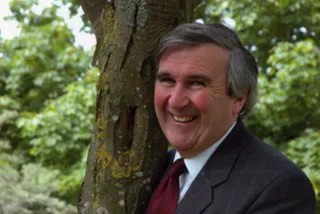
Why A Good Teacher Can Change Lives | A Q&A with Gervase Phinn
Education adviser, school inspector and visiting Professor of Education at the University of Teesside, Gervase Phinn mixes his natural wit with his experience on the after-dinner circuit. We spoke to the Yorkshireman to find out more about his time teaching and inspecting schools, why a good teacher can change lives, and how the education sector has evolved over the years.
Can you tell us briefly about your background in education?
I was born in Rotherham in 1946, so I’m a bit long in the tooth now, with over 40 years in education! My experience has been in teaching, management in schools and inspecting schools, and I’ve worked with children and teachers from early years right through to further education.
I started teaching the classroom at a range of schools (a Catholic school, a social priority school, a 14-18 upper school, and so on) before moving on to become an educational supervisor in Rotherham in 1981 and later a senior inspector for English, Drama, and Libraries in North Yorkshire. I left that job to become an inspector with HMI for a short period. Now, I am a visiting professor at the University of Teesside - I speak on the after-dinner circuit and at conferences, I lecture on cruise ships, and I’ve also written over a hundred books – including novels, children’s stories, plays, and so on.
How does your experience inspecting and teaching in schools translate to the after dinner circuit?
In terms of my speaking, I give after-dinner talks and conferences to a wide variety of audiences, as well as doing quite a bit of charity work throughout the year. My talks on the after dinner circuit are upbeat and not in any way offensive – they’re observational, anecdotal and about children and schools. I do quite a lot of these talks for rotaries, chartered accountants, professional associations, mayor’s dinners. etc. and I also speak to the likes of the Women’s Institute.
Do your books focus on education?
My novels and semi-autobiographical books are based on my experiences in schools with children and teachers. They are observational, anecdotal, inoffensive, and, I suppose, in the style of James Herriot (I’ve been described as the James Herriot of education).
I was lucky to become a published author in my 20s. When I was at university, I got the best advice that any would-be writer could get:
- Read, read and read, because off the back of reading is writing.
- Observe people and their mannerisms.
- Keep a notebook with these observations and stories.
Do you think there is a big difference in education between now and when you started first teaching?
Yes, of course - education has undergone massive changes over the years. Indeed, I’ve spoken about these changes to the NUT (National Union of Teachers) in London.
For example, back when I started teaching in the 70s, there was no curriculum to follow, but, since then, we’ve had a National Curriculum instituted, not to mention the whole system of inspection of schools. Then, of course, there’s also the difference between private and state schools – private schools do not have the same kind of restrictions that the state schools have in terms of the inspection system.
In my opinion, morale seems to be very low nowadays amongst teachers as they are overburdened with paperwork and a rather Draconian inspection system. My view is that if teachers were allowed to be a bit more adventurous and creative in their teaching, the education system would reach the standards that we’re constantly trying to lever them up to, but instead, we’re possibly spending too much time weighing the pig than feeding it!
I don’t talk always about education necessarily though – my after-dinner talks are really about the things that children say and why they are such a delight. When I speak, I’m not there to pontificate and tell my audience all the answers to education. What I do is to the explain why teaching is the best job.
Do you have any particularly memorable moments that emphasised the importance of teaching to you?
Bishop and public speaker Samuel Wilberforce once said, 'Good teachers take on the most important role in society for they change lives', and it’s true. Young people get a very bad press sometimes, and a good teacher is somebody who likes young people, thrives in their company and is optimistic about them.
I’ll always remember something that happened to me while on my way to speak at a big national conference in London. I arrived at the hotel where it was taking place, and the doorman asked me to talk to the general manager, who apparently was very angry with me for some unknown reason! Nervously, I went to his office, and the general manager said, “I have a bone to pick with you, Mr. Phinn.” He went on, “You never believed me when I told you that the dog ate my homework!” Turned out that I used to teach him and had made him rewrite his homework one break time! He then said, “I wouldn’t be here now doing this if I hadn’t had teachers like you.” That is certainly one of the greatest comments a teacher can ever get and is, to me, what makes teaching the best job in the world.
For further information call us on or email info@speakerscorner.co.uk .
Newsletter Sign Up
If you liked this article then why not sign up to our newsletters? We promise to send interesting and useful interviews, tips and blogs, plus free event invites too.
Have an enquiry?
Send us a message online and we'll respond within the hour during business hours. Alternatively, please call us our friendly team of experts on +44 (0) 20 7607 7070.
